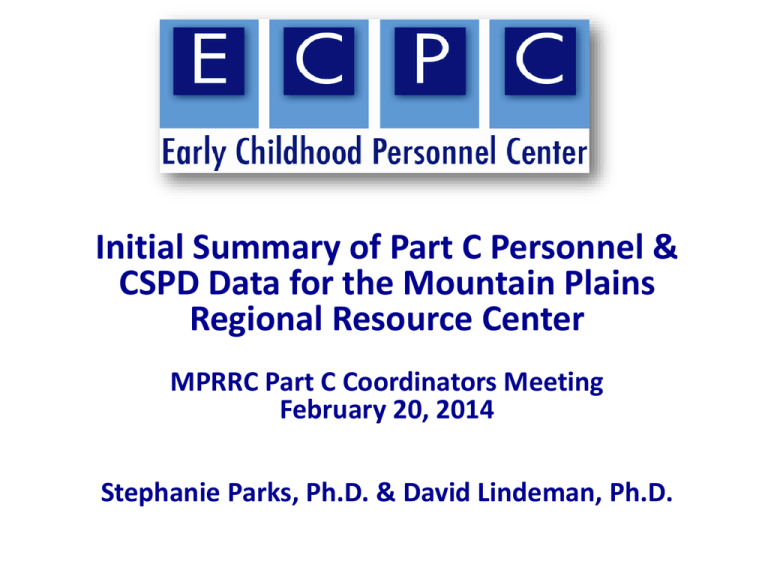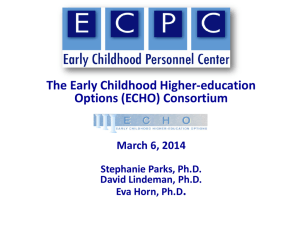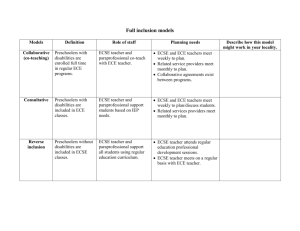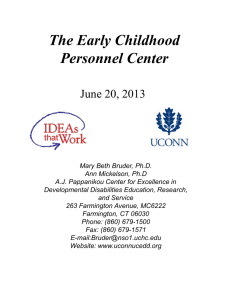Initial Summary of Part C Personnel & CSPD data for the Mountain
advertisement

Initial Summary of Part C Personnel & CSPD Data for the Mountain Plains Regional Resource Center MPRRC Part C Coordinators Meeting February 20, 2014 Stephanie Parks, Ph.D. & David Lindeman, Ph.D. ECPC Mission: Our Mission is to facilitate the implementation of integrated early early childhood comprehensive system of personnel development (CSPD) for all disciplines serving infants and young children with disabilities Funded To: • Serve as a national resource on personnel standards, competencies, and recommended practices • Assist states to align standards with national professional organization standards • Assist states and IHEs to align preservice and inservice • Assist states in the development of CSPD National Resource to: • State Education Agencies (SEA) • Lead Part C Agencies • Other Early Care and Education Agencies • Institutes of Higher Education (IHE) • Other Entities ECPC Partners: • • • • • • • • • ECTA Center DaSy Center ECO Center Iris Center AUCD CEC HECSE ITCA DEC • • • • • • • • Part B/619 Consortia NAECS-SDE NAEYC NASDSE NASDTEC CCSSO NHSA NRCP ECPC Regions Western Region – University of Oregon Mid-Western Region - University of Kansas South and Mid-Atlantic Region – Florida State University Northeast Region – University of Connecticut ECPC Midwestern States and MPRRC States • States In Common – – – – – – – – – Colorado Kansas Montana Nebraska New Mexico North Dakota South Dakota Utah Wyoming • States Not in Common ECPC – – – – – Arkansas Louisiana Missouri Oklahoma Texas MPRRC – Arizona – Bureau of Indian Education ECPC Guiding Principles 1. All interventions delivered with fidelity across providers and settings 2. High Quality Coordinated Pre-Service & In-service 3. Common set of evidence based, measurable, and authentic personnel standards across disciplines 4. Personnel preparation and professional development agencies are knowledgeable and skilled in EvidenceBased Practices as implementation of strategies of adult learning 5. Comprehensiv e System of Personnel Development is: • Necessary • Quality Indicator Needs Assessment Personnel Standards Inservice Preservice Evaluation Technical Assistance Why an EC CSPD is Important High Quality CSPD (State System) EC Leadership, Skills & Competencies Technical Assistance & Improved EI & ECSE Services Knowledge Development Dissemination Leadership and Coordination ECPC Activities Improved Child & Family Outcomes Current Resources Website: ecpcta.org • About Us – Values, Framework, Evaluation, Staff, Collaborators & Stakeholders • CSPD Implementation – CSPD Components, State & Regional Activities, Communities of Practice • Personnel Standards – State and National Organization Standards • Resources – IHE/PD Faculty & Staff, Families, Graduate Students, EC Interventionists • Our Work – Papers & Presentations, Powerpoints, Webinars State Specific Requirements Resources Website: ecpcta.org http://www.ecpcta.org/personnel_standards/ ECPC Knowledge Generation Task I: Status of Licensure / Certification Requirements • Web-Search to understand requirements for Part C & B 619 • 14 Disciplines across 50 states and territories Task 2: States’ Perspective of our CSPD Framework • Part B 619 and Part C Coordinators and/or PD Providers Interviews • Common perceptions, practices, and innovative initiatives • Barriers and facilitators to CSPD Implementation Task I: Web Search Licensure Requirements Disciplines ECSE ECE OT PT SLP Audiologist RN Registered Dietitian Social Worker Family Therapist Clinical Psychologist School Psychologist Vision Specialist Deaf / HI Specialist O & M (Orientation & Mobility Specialist) BCBA (Board Certified Behavior Analyst) Infant Mental Health Specialist From All 50 States & Territories Typical Websites: State Department of Education Part C Infant Toddler Programs Department of Health Professional Discipline Licensure Boards National Professional Organizations Information Gathered per Discipline Name of license / certification Min Degree Level Requirement Age Range College / University Programs Additional Part C Requirements http://www.ecpcta.org/personnel_standards/ Related Service Providers (OT, PT, SLP) Age Range National Exam Age Range National Exam AZ Birth to Death X NM Birth to Death X CO Birth to Death X ND Birth to Death X KS Birth to Death X SD Birth to Death X MT Birth to Death X UT Birth to Death X NE Birth to Death X WY Birth to Death X State State OT Requirements Min Degree University Programs Min Degree University Programs AZ CO KS MT NE Masters Bachelors Masters Masters Masters 2 1 1 0 2 NM ND SD UT WY Graduate* Graduate* Bachelors Masters Graduate* 2 1 1 1 0 * Must be a graduate from an accredited OT program PT Requirements Min Degree University Programs AZ CO KS MT NE Graduate* Graduate* Masters Masters Masters 4 2 2 1 2 ND SD UT WY Graduate* Masters Masters 1 1 0 NM Min Degree University Programs Graduate* Graduate* 1 2 * Must be a graduate from an accredited PT program SLP Requirements Min Degree University Programs Min Degree University Programs AZ CO KS MT NE Masters Masters Masters Masters Masters 3 2 4 1 3 NM ND SD UT WY Masters Masters Masters Masters Masters 3 2 1 3 1 Summary: OT, PT, SLP • National Professional Organization Exam • State Board Licenses • Birth to Death • 0 – 4 University Programs per state Any surprises so far? ECSE / ECE State Age Range University Programs AZ • Early Childhood Special Education • Early Childhood Education B – age 5 B – age 8 2 4 CO • Early Childhood Special Education • Early Childhood Education B – age 8 B – age 8 3 7 • Early Childhood Unified (Blended) B – 3rd grade B–K 9 • Special Education Endorsement* Added on (minor in SPED) P – 12th grade 7 • Early Childhood Inclusive (Blended) • Preschool Disabilities • ECSE Endorsement* B–K B – 3rd grade B-K 7 KS MT NE Name of Certificate or License * = other degree combinations may count (ex. ECE + Gen SPED) ECSE / ECE State Name of Certificate or License NM • Early Childhood • Special Education ND • Early Childhood Endorsement • Early Childhood Special Education SD • B-Preschool Special Ed. Endorsement* (18 Hours of coursework added on) • B-Preschool Ed. Endorsement* OR EC Regular Education (added on to Elem) UT • Preschool Special Education • Elementary Education + Early Childhood area of concentration WY • Early Childhood / Special Education • Early Childhood Age Range University Programs B – 3rd grade PK – 12th grade 8 5 B – 3rd grade B – 3rd grade 3 2 B – age 8 1 B – Preschool 2 B – age 5 K – 3rd grade 2 3 B – age 5 B – age 8 3 5 * = degree combinations (ex. ECE + Gen SPED) or add-on endorsements may count Summary: ECSE / ECE Limited Consistency . . . • Education License EC ECSE Elem SPED Endorsement (added on) • Degree: Minor in SPED to Bachelor’s • Age Range: B - 5 to P - 12th grade • 1 to 9 University Programs per state Special Instruction Services State Name / Service AZ Developmental Special Instructionist (DSI) CO Developmental Intervention Services KS MT NE Special Instruction Provider Min Degree Bachelor’s Degree Education License in EC, ECSE, or Degree in Family Studies Bachelor’s Degree Education License in: ECSE or EC Bachelor’s Degree Education License in: Early Childhood Unified (Blended License) Family Support Specialist Bachelor’s Degree in Child Development, (Certificate) Elementary or Special Education, or a EC Practitioner Registry related field Special Instruction Service Provider Bachelor’s Degree Education License: Early Childhood Education - Inclusive (Blended License) Special Instruction Services State Name / Service Min Degree NM Developmental Specialist (Certification) Bachelor’s Degree Education License in: Elem, EC, or Special Education + others ND Specialized Instruction Bachelor’s Degree Education License in Special Education SD Special Instruction Bachelor’s Degree Education License: B – Preschool Special Education Endorsement UT Special Instruction (Levels) Associate’s or Bachelor’s Degree Preschool SPED Accepts: Special Ed License (K-12) WY Special Instruction Bachelor’s Degree in Early Childhood Special Education Additional Part C Requirements ECE/ECSE OT PT SLP AZ YES AzEIP Certificate YES AzEIP Certificate YES AzEIP Certificate YES AzEIP Certificate CO NO NO NO NO KS NO NO NO NO MT YES Family Support Specialist Certificate (EC Practitioner Registry) NO NO NO NE NO NO NO NO Additional Part C Requirements EC/ECSE OT PT SLP NM YES Developmental Specialist Certification NO NO NO ND NO NO NO NO SD NO NO NO NO UT YES Baby Watch EI Credential YES Baby Watch EI Credential YES Baby Watch EI Credential YES Baby Watch EI Credential WY NO NO NO NO Summary: Special Instruction Services • Education License EC ECSE Elementary SPED (K- 12th) Related Field • Range of Degrees Accepted Minor in SPED Associate’s Degree Bachelor’s Degree • Extra Credential Wide Range of Qualifications Special Instruction State Expectations # of States (n = 10) Several degrees accepted from education and other 5 related fields Degrees including ECE or Family Studies only (without special education training) 2 Specific ECSE or Blended Degrees only 3 Extra credential or certificate required for Special Instructor 4 Service Discipline Qualifications Supervised by Special Instruction ECSE ECU License Program Director Occupational Therapy OT State OT License Program Director Occupational Therapy COTA State COTA License Occupational Therapist Augmentative Communication SLP State SLP License Program Director Augmentative Communication OT State OT License Program Director ECPC Knowledge Generation Task I: Status of Licensure / Certification Requirements • Web-Search to understand requirements for Part C & B 619 • 14 Disciplines across 50 states and territories Task 2: States’ Perspective of our CSPD Framework • Part B 619 and Part C Coordinators and/or PD Providers Interviews • Common perceptions, practices, and innovative initiatives • Barriers and facilitators to CSPD Implementation Interview Topics 1. 2. 3. 4. Verify State Requirements (Web-search) Description of Part C Services Personnel Development System CSPD Components: Ongoing Needs Assessment Appropriate Licensure / Certification Data Systems for Personnel TA Availability 5. Priority CSPD Components 6. Other National Centers 7. Anything or Anyone Else? Evaluation of CSPD System Pre-Service Programs Systematic, Effective In-service Dissemination TA Availability Dissemination of EBP 9 States Data System for Personnel IHE Programs to provide 8 States Evaluation of System Appropriate Licensure or Certification 7 States Ongoing, Systematic and Effective PD In-service Opportunities Ongoing Needs Assessment “Yes” In Place Pre-service Training What CSPD Components are in place in your state? MPRRC: Part C CSPD Components 7 States 4 States 7 States 9 States 9 States Part C Coordinators most frequently said, “Yes . . . but it could be better if . . .” or “Kind of” Priority Or Need 5 States 4 States 2 States 2 States 7 States 2 States 2 States Favorite response: “Everything! We need help with everything!” 3 States Common Themes Recruitment and Retention Funding Collaboration E-learning Systematic & Ongoing PD Sustainability & Implementation Current Resources Website: ecpcta.org • About Us – Values, Framework, Evaluation, Staff, Collaborators & Stakeholders • CSPD Implementation – CSPD Components, State & Regional Activities, Communities of Practice • Personnel Standards – State and National Organization Standards • Resources – IHE/PD Faculty & Staff, Families, Graduate Students, EC Interventionists • Our Work – Papers & Presentations, Powerpoints, Webinars What Do We Do? General Technical Assistance – Learning opportunities for a variety of stakeholders on topics related to personnel development Targeted Technical Assistance - Supporting state agencies and IHEs with alignment of preservice and inservice and aligning personnel standards to national professional organization standards, state early childhood standards, and state competencies and certification/licensure standards Intensive Technical Assistance – Supporting states in the development and implementation of an integrated comprehensive system of personnel development. ECPC Mid-Western Region Contact Information Eva Horn, PhD David Lindeman, PhD Co-Associate Director Professor of Education University of Kansas evahorn@ku.edu 785-864-0615 Co-Associate Director Senior Scientist University of Kansas lindeman@ku.edu 620-421-6550 x1713 Stephanie Parks, PhD Na Young Kong, PhD Regional Project Coordinator University of Kansas s.parks@ku.edu 785-864-6843 Research Associate University of Kansas chellina@ku.edu 785-864-6843 The Early Childhood Personnel Center is a project of the University of Connecticut funded through cooperative agreement (# H325B120004) from the Office of Special Education Programs, U.S. Department of Education, with subcontracts with Florida State University, University of Kansas, and University of Oregon.







